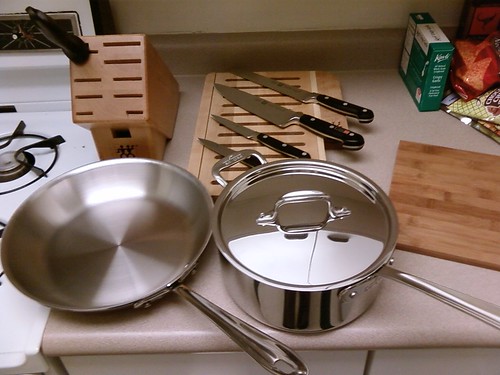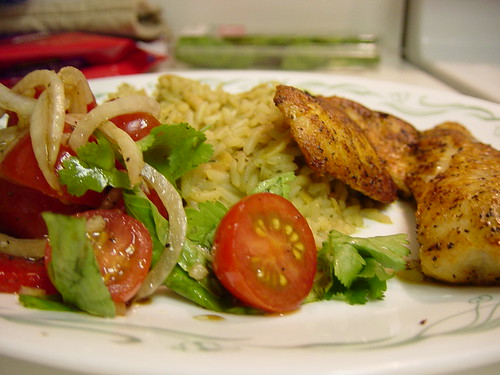A friend posted
this link on Facebook (thanks!), and it made me spend some time thinking about an issue that's been nagging at me for quite some time: my dinner.
The link is to an NPR article on working women and home-cooked meals. After Mitt Romney claimed that women need more flexibility in the workplace so that they can get home and cook dinner, the issue has been forced into the spotlight.
Women have certainly reduced the amount of time they spend in the kitchen (and increased the amount of time they spend in the workplace) over the last several decades. Men have increased the amount of time they spend on housework, but the gender disparity in housework still exists. The NPR article explains:
On an average weekday, working women spent more than twice as long (35 minutes) as working men (15 minutes) whipping up meals and cleaning up afterwards, according to the latest data from the Bureau of Labor Statistics' American Time Use Survey.
And:
In 1965, she notes, women did about 30 hours of housework per week on average; by 1995, that weekly average dropped to 17.5 hours. During that same time period, men doubled the amount of time they spent on housework — from 5 hours to 10.
While much of this change has happened because of shifting workplace expectations, they are also the result of differences in how we consume our food. Since the 1960's our food has become increasingly "convenient": pre-packaged and processed.
So, while women spending less time "whipping up meals" may be seen as a feminist success, our lives are complicated. We don't just have one set of concerns; we have many. I am very concerned about workplace equality, but I am also concerned about the quality of my food. These two things do not exist in separate spheres: they exist in me, one body that has to move throughout the day and make decisions about how to handle the real-world implications of these concerns.
Feminism Vs. Homesteading
As concerns over our
Standard American Diet (SAD--isn't that cute?) grow, new movements have risen to answer them. The way that we eat--especially the chemical additives--has been linked to all kinds of negative health outcomes:
obesity,
diabetes,
Alzheimer's,
depression. The growing body of knowledge about these potential dangers has pushed consumers to fight back. Movements like
Just Label It are trying to force food companies to tell us what we're eating and many are trying to legislate what can go in our foods.
In the meantime, several people are fighting back on a micro-level by changing their individual diets. Whether you call it "clean eating," "a whole-food diet," or something else, many people are cutting processed foods and making an effort to eat in a way that they think is healthier.
The spread of these movements has been made easier by the internet, and several blogs have cropped up to help people make these changes in their own life. Sites like
100 Days of Real Food,
Black Girl's Guide to Weight Loss,
Whole Food Mommies,
The Gracious Pantry,
The Clean Eating Mama, and
The Sprouted Kitchen are all popular places to find recipes, philosophy, and tips on these types of diets.
Perhaps not surprisingly, many of these sites are run by women. Women, after all, have traditionally spent more time in the kitchen, and we're more likely to make the food purchasing decisions for our households. We're also more likely to take our personal lives into the online world through blogs, so the intersection creates a woman-dominanted niche. But this movement also appeals to men. A more male-centric version of "clean eating" has cropped up in the form of the
paleo diet, which also has a large online community. Many of the researchers behind this food movement are also men, such as
Michael Pollan, the whole food guru. Still, the mainstreaming of the whole foods movement is largely taking place with women (particularly moms) at the frontline.
 |
| Weapons in the war on SAD. |
Of course, being the mean little humans that we are, we can't just quietly adopt our own lifestyle and slip gently into the kitchen to cook our meals; we have to be loud and righteous about it. Just as the very real concerns about baby formula too often manifest themselves as shaming women who bottle feed or the absolutely scientifically-justified promotion of fitness turns into public shaming of people's bodies, the completely logical assault on the SAD too often comes to fruition as shaming people's food choices.
And there are other women on different frontlines who aren't having it; feminism and homesteading have come to blows. Mary Rechner does a great job of capturing that tension
here:
It is of the utmost importance to me to resist the earthy lure of urban homesteading. Why shouldn’t I, a writer, mother, and arts administrator living in 2012 who also does most of the shopping and cooking in my family, take advantage of the relative ease of obtaining healthy food at the supermarket? I refuse to accept the moral imperative of growing my own vegetables, butchering the animals I eat, and making my own jam.
There are blueberries, raspberries, currants, strawberries, and a few squash plants among the flowers in my yard. Who doesn’t love picking and eating a strawberry? But I refuse the burden of a harvest. When I see women with their kids (they usually also have a dog or two) weeding their vegetable gardens and tending their flocks of chickens, I fear they have bought the idea that these many labors are the markers of what it means to be a good mother-wife-woman.
And as
Jennifer Jeffrey points out, the "whole foods" movement isn't exactly new. This used to be how we ate out of necessity, and then women were simply expected to do all of these things that we now consider to be extra. Is shaming women back into those old roles just reinforcing the old sexism?
Ladies, when we cluck our tongues at drive-through lanes and packaged convenience food, we are forgetting that convenience has been our friend. The fact that women hold more executive positions than at any other time in history, and can freely choose any career path they like is in no small part due to the prevalence of supermarkets and the availability of easy-to-prepare foodstuffs.
Something's got to give, right? We can't really expect to log in a 10-hour workday and then come home and prepare a 3-hour meal. At some point, we just run out of hours, let alone energy and ambition. If we shame women for not spending enough time working over their food, are we actively trying to push them away from working over their jobs? And isn't pushing women back into the kitchen--even under the banner of promoting health--still sexist?
Feminist Homesteading
But, like most dichotomies, this one isn't as simple as it first appears. There is not feminism on one end and homesteading on the other. There are plenty of feminist homesteaders, in a variety of combinations. Whether someone is a "radical" feminist who is out protesting for women's rights and also shopping at farmer's markets with an occasional stop at McDonald's or a "radical" whole foods activist who is
dressed as a GMO in front of Monsanto who also cares about who is legislating her birth control access, there are millions of us who share concerns in both of these arenas. We are not enemies, and we are not a continuum; we are friends, and we are the same people.
Furthermore, we have a lot of overlapping concerns.
As Peggy Orenstein writes in her article "
The Femivore's Dilemma" (I know I have 8 billion links in this article, but if you only click one of them, click this one):
Femivorism is grounded in the very principles of self-sufficiency, autonomy and personal fulfillment that drove women into the work force in the first place. Given how conscious (not to say obsessive) everyone has become about the source of their food — who these days can’t wax poetic about compost? — it also confers instant legitimacy. Rather than embodying the limits of one movement, femivores expand those of another: feeding their families clean, flavorful food; reducing their carbon footprints; producing sustainably instead of consuming rampantly. What could be more vital, more gratifying, more morally defensible?
There is even an economic argument for choosing a literal nest egg over a figurative one. Conventional feminist wisdom held that two incomes were necessary to provide a family’s basic needs — not to mention to guard against job loss, catastrophic illness, divorce or the death of a spouse. Femivores suggest that knowing how to feed and clothe yourself regardless of circumstance, to turn paucity into plenty, is an equal — possibly greater — safety net. After all, who is better equipped to weather this economy, the high-earning woman who loses her job or the frugal homemaker who can count her chickens?
That last point is the one that interests me most. "Femivores" are challenging the patriarchy in new ways.
And these are ways we need to see. Sure, there are several women who are going to be amazing CEOs of Fortune 500 companies, and we need to smash the glass ceilings that would prevent them from getting there. Women are every bit as capable as men, and we need to fight for equal pay and flexible benefits (for everyone, because being human (not woman) requires flexibility, and men care about their families, too).
But we cannot pretend that there aren't patriarchal structures holding up that rise-to-economic-power model. When
Elizabeth Wurtzel claimed that the only kind of equality was economic, she was ignoring that there most certainly are other kinds of power, and the power to feed ourselves and sustain our bodies in a healthy way are not minimal. And we cannot pretend that there's only one way to smash the patriarchy. We can fight to have more women CEOs while simultaneously fighting for more nourishing food. They are not at odds.
As Heather Laine Talley explains,
food is a feminist issue:
Food is a feminist issue because our health is a result, in part, of what we eat. Given our overarching concerns about health, feminism cannot shy away from taking up food. All food provides the body with calories. Some food contains nutrients—vitamins, fiber, essential fatty acids. Twinkies do not. We must challenge nutrition claims steeped in body fascism, but we also have to confront the idea that feminist eating resembles a kind of Bacchanalian backlash to diet culture. Such living is reactionary not revolutionary.
And this isn't just a personal issue. There are feminist issues wrapped around the food chain from top to bottom. When our food is harvested in countries far away where the pesticides leach into the water supplies of local people, that's a feminist issue. When our "convenience" culture promotes minimum-wage food manufacturing jobs that cannot provide a quality of life to the people who take them, that's a feminist issue. When companies refuse to label the foods they produce so that we can know what is going into our bodies, that's a feminist issue.
And when we allow the dichotomy of feminist v. homesteader to divide us at the places we are strongest, we lose the chance to stand up to all these issues.
Photos: richpompetti, liv,


















